Book contents
- Frontmatter
- Contents
- List of Illustrations
- Acknowledgements
- Introduction
- Recent Directions in Medieval Manuscript Study
- Another Fine Manuscript Mess: Authors, Editors and Readers of Piers Plowman
- A New Approach to the Witnesses and Text of the Canterbury Tales
- Prospecting in the Archives: Middle English Verse in Record Repositories
- Medieval Manuscripts and Electronic Media: Observations on Future Possibilities
- Representing the Middle English Manuscript
- Skins, Sheets and Quires
- Reconsidering the Auchinleck Manuscript
- Professional Readers of Langland at Home and Abroad: New Directions in the Political and Bureaucratic Codicology of Piers Plowman
- Professional Scribes? Identifying English Scribes Who Had a Hand in More Than One Manuscript
- Manuscript Production in Medieval Theatre: The German Carnival Plays
- The ‘Lancelot-Graal’ Project
- After Chaucer: Resituating Middle English Poetry in the Late Medieval and Early Modern Period
- Notes on Contributors
- Index
Another Fine Manuscript Mess: Authors, Editors and Readers of Piers Plowman
Published online by Cambridge University Press: 05 September 2014
- Frontmatter
- Contents
- List of Illustrations
- Acknowledgements
- Introduction
- Recent Directions in Medieval Manuscript Study
- Another Fine Manuscript Mess: Authors, Editors and Readers of Piers Plowman
- A New Approach to the Witnesses and Text of the Canterbury Tales
- Prospecting in the Archives: Middle English Verse in Record Repositories
- Medieval Manuscripts and Electronic Media: Observations on Future Possibilities
- Representing the Middle English Manuscript
- Skins, Sheets and Quires
- Reconsidering the Auchinleck Manuscript
- Professional Readers of Langland at Home and Abroad: New Directions in the Political and Bureaucratic Codicology of Piers Plowman
- Professional Scribes? Identifying English Scribes Who Had a Hand in More Than One Manuscript
- Manuscript Production in Medieval Theatre: The German Carnival Plays
- The ‘Lancelot-Graal’ Project
- After Chaucer: Resituating Middle English Poetry in the Late Medieval and Early Modern Period
- Notes on Contributors
- Index
Summary
Scholars refer so often to the constant rewriting of Piers Plowman and the order of its versions (A, B, C with perhaps an earlier Z) that we sometimes forget that both are speculative assumptions drawn from puzzling manuscript evidence. Piers Plowman survives in over fifty manuscripts representing about a dozen distinct textual forms. For example, there are six A-manuscripts with C endings, two textual traditions of the B-version, and one manuscript that combines the three principal versions. There is an even greater variety of presentational and commentary schemes. Several Piers manuscripts have more than the usual passus initials, others differently divide the several passus, and one C-manuscript contains a series of illustrations. Most Piers manuscripts have some form of annotation, but each program is unique – sometimes heavy, sometimes light, often by the original scribe but sometimes by a variety of later readers.
We owe much to those who have struggled so hard to bring order out of this chaos. As a tourist from literary criticism undoubtedly in over my head in the treacherous waters of textual studies, I come not to make one more effort to tidy up the Piers manuscript mess but instead to celebrate it. The ‘fine mess’ of my title is not meant to be said with the sarcastic exasperation of Oliver Hardy but with admiration. My inspiration comes from Derek Pearsall, though he may not agree with my conclusions.
- Type
- Chapter
- Information
- New Directions in Later Medieval Manuscript StudiesEssays from the 1998 Harvard Conference, pp. 15 - 28Publisher: Boydell & BrewerPrint publication year: 2000



